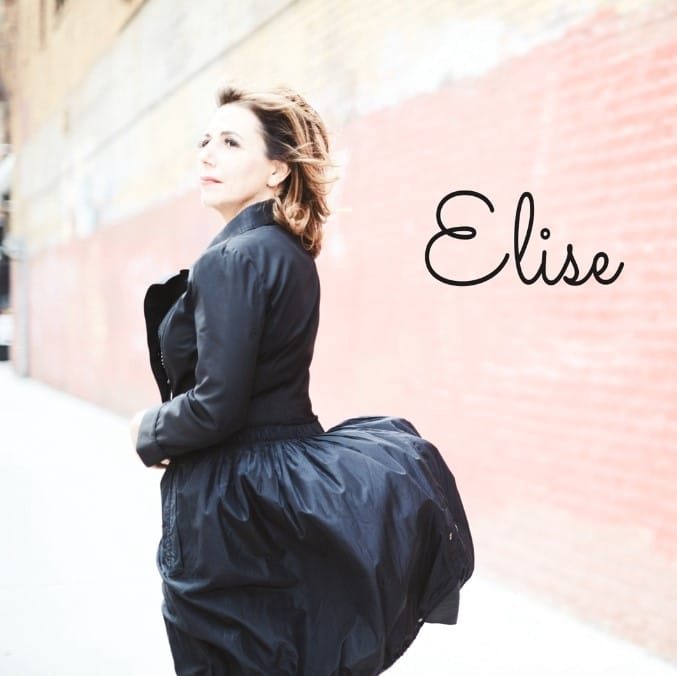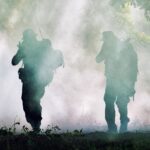by Elise Lerner
Listen on YouTube, Apple Music, or Spotify.
Music & Lyrics, Elise Wiener
Oooh got the beat of this city street
Caught up in my high-heeled stride
Trying not to catch your eye
You’ve got a milk crate for a throne
Holding up a cardboard sign
Homeless Vet please give
A dollar or a dime
_______
It was a balmy evening. Manhattan starlight speckled the black heavens. I stepped from street to curb, balancing my orange stiletto on the sidewalk so as not to chip my polish or catch my heel in a crack. City sparkle fluttered through my chest like butterflies. I had been holding my husband’s hand, leading. His skin was warm.
We didn’t get to the city much. The drive from New Haven was almost two hours. I was a stay-at-home mom and we hesitated to leave our two children under five with a babysitter. But it was a special occasion—my birthday—and I was soon to give birth to our third. My best friend Maggie and her husband trailed a few steps behind. They had just moved from France. I was proud to show them New York City. We bathed in friendship.
The chrome door of Carmela’s loomed before us. On each side of the portico were Palladian windows, curtained in velvet, behind which diners sat by candlelight at white tablecloths. I noticed a dark shadow on the ground below one window. Wedged against the wall, wrapped in torn blankets and newspapers, was a body. I could see he was alive. Was he ill? A burning cigarette butt and an empty Marlboro box lay on the ground near his charcoal fingers. I could barely make out his face under his toothpick hair. In front of the man was an empty tin can. A bent piece of cardboard lay on the pavement. “Homeless Vet. Please give” was scrawled in black marker.
I let go of my husband’s hand and looked down. I pulled open the door for my friends. The smell of steak wafted out the door. We avoided each other’s eyes. Shadow and stench followed me into the restaurant— A shadow of sorrow, shadow of helplessness, shadow of humiliation. The stench of unchanged shoes, unwashed hair, dumpsters, and dead ends. The stench of piss and dung. The stench of my shame.
______________
Bring back your story
The GI no one knows
For you must be a hero
Disguised in beggar’s clothes
Once upon a time
Goodbye love was on your lips
A chest puffed with pride
Did you know the risk?
______________

Long Khanh Province, Republic of Vietnam, SP4 R. Richter, 4th Battalion, 503rd Infantry, 173rd Airborne Brigade. Sergeant Daniel E. Spencer stares down at their fallen comrade. The day’s battle ended, they await the helicopter which will evacuate their comrade from the jungle-covered hills. Source.
I have to admit, I was an oblivious kid. I grew up in the Sixties and the Seventies when politics were heated. But I stayed under the radar and kept my head in the sand. In middle school, my brother and father talked about current events at dinner. I didn’t understand any of it. For a time, I didn’t know what Vietnam was. Conscientious objector was just another compound word I couldn’t say. I couldn’t even tell you who was president. I didn’t want to know. I wanted to eat my mashed potatoes. I wanted to finish dinner so I could watch Star Trek. I wanted to be cool enough to listen to the Beatles. I wanted my brother’s friends to notice me.
Still, I managed to stumble on a moment in history that moved me more than any lesson I had been taught. Nobody saw it. Not even me.
I was eleven, doing chores at dinnertime, tearing iceberg lettuce in just-so pieces, exactly as my mother had asked, into the salad bowl. The news was blaring from the other room, as it always was at this hour. The newscaster droned on. I tore my lettuce in rhythm. The sound stopped. I looked up.
The screen was blue—neon blue—with the word “Casualties” in black. And numbers—lots of numbers–long numbers, short numbers, numbers with commas.
I could see my dad sitting at the white Formica table in the sunken den, Manhattan in hand, chess board set, the New York Times folded in eighths. The paper was open to the crossword page for his evening ritual, playing the chess column. He was wearing a plaid button-down with a pocket for his glasses. It was dark outside the sliding glass doors, but the curtains were yet to be drawn. My father was studying the TV. A pawn had fallen off the board and was laying on its side.
The newsman’s words cut the blue screen. “Two hundred seventy-four American soldiers were killed in action this week.” I was stuck in a choke hold, “Thirteen hundred and twenty were wounded.” Sucker punch to the stomach “And twelve are missing.” For God’s sake, somebody scream!
Something told me not to look away.
Across the mosaic floor from TV to the kitchen, over the head of my father in his green swivel chair, I stared at the numbers, imagining. I piled as many men as high as I could count into my consciousness. Until it hurt. Where were they now? I tried to imagine what it was like to be dead. Or wounded. Or captured. Nobody I had ever known had died. I knew I was lucky. I was safe and sound in a kitchen tearing lettuce. I imagined guns shooting, bombs exploding, and bodies lying on the ground. I imagined families with holes.
It would become a call of duty, my pint-size Vietnam: where evening news met the edge of life and words no longer made sense. A place where I could visit the lost and pay my respects.
“Dinner!” My mother called.

Vietnam War Veterans Memorial Source.
______________
I’m writing you this country song
Cause this land is yours so much more than mine
You’re sitting in the ashes
We’re dancing on the flames
Of your sacrifice, sacrifice
_______________
After that birthday dinner in Manhattan, a familiar dread returned. I couldn’t shake the image of the homeless man lying on the street. I felt ashamed of my hardened heart.
I went to my Rabbi.
I met him in his study, books floor to ceiling. We sat at a long table. I began to cry. I wanted to know: Are the sins in your life tabulated? Do you pay for your complicity when you die? He looked at me puzzled.
“Like—are we going to pay for the fact that our sneakers are made by slaves in China?” I said, “When we knew all along but bought them anyway?”
He invoked God’s name, to meet the gravity of my answerless question.
I told him the story about the homeless man. “So, when someone asks you for help, do you have to give?” I said, “I mean, will I be punished because I walked by?” He was silent. I panicked.
“Well then, Rabbi, what do YOU do when that happens to YOU?” I said.
He sighed and then spoke in a low tone. “If a person feels bad enough that they have to ask, I give.”
______________
Pain of war, my greatest fear
If I talk to you, will I disappear?
_______________
I went home and wrote the music and the lyrics for “Country Song.” A few weeks later, I started recording it in Brooklyn. Taking the train once a week to Grand Central Station, I came across a lot of homeless people. I began bringing small bills with me, ones and fives and tens, and made a deal with myself to give when I could. One time I bribed a woman in Grand Central with a twenty if she would sit with me for fifteen minutes for a coffee. On 42nd Street, I gifted a muffin and offered a few kind words as I walked by. On the Upper West Side, I bought a homeless vet a snack and stood for a while on the corner with him, thanking him for his service. His eyes lit up and he blessed me. But I couldn’t keep it up. I found excuses. Life moved on. Circumstances changed. Blah, Blah, Blah…
______________
I’m writing you this country song
Cause this land is yours, so much more than mine
Toss these lines into your cup
The voice of every man
Demand we give a damn
______________
Every once in a while, the haunt of childhood returns—that freeze of taking everything in— in empathy and fear—for others and myself. But to what end?
I know I’ve been lucky. I’m grateful. I’ve never fought in a war. I’m not a statistic like the brave soldiers who fought for me and my country, then vanished into numbers on a blue tv screen.
It’s time to finish what I started—do something more than feel, something more than take. But what?
______________
If I were president, If I were king
The parade of people rushing by
Would raise you up and sing…
________________

Elise Lerner is a Connecticut-based writer, songwriter, book artist, and proud mother of three. Her work integrates vision, language, and sound which form the combination of her passions as an artist. Her writing has been published in Lilith Magazine, Literary Yard, and Sad Girls Club. She is currently working on her first novel.
As a songwriter and composer, Elise has released multiple tracks (under her former name Elise Wiener.) Most recently her song, “A Midnight Wish” has been released by world-renowned Jazz trumpeter and vocalist Benny Benack III and arranger Steven Feifke on their album Season’s Swingin’ Greetings Deluxe Edition.
Elise received her BA from Brandeis University, Massachusetts, and continued her studies at Massachusetts College of Art as well as School of Visual Arts (NYC) in fiber arts, papermaking, and weaving. Upon graduating from college, she began her career in textile and greeting card design and was a two-time winner of the “Louie Award” from the National Greeting Card Association in Washington D.C. Her work evolved over the years, leading her to exhibit at The Center for Book Arts, NYC, Pyramid Atlantic Arts Center, MD, Torpedo Factory Art Center, VA, Desotorow Gallery, GA, Susan B. Hilles Gallery, Creative Arts Workshop, CT and internationally in Sofia Bulgaria at Ameterus International Paper Art Exhibition. Her books have won purchase awards at the Hybrid Book Fair in Philadelphia and are in private and public collections including Paley Library, Temple University, PA.
As the Voice of the Veteran Community, The Havok Journal seeks to publish a variety of perspectives on a number of sensitive subjects. Unless specifically noted otherwise, nothing we publish is an official point of view of The Havok Journal or any part of the U.S. government.
Buy Me A Coffee
The Havok Journal seeks to serve as a voice of the Veteran and First Responder communities through a focus on current affairs and articles of interest to the public in general, and the veteran community in particular. We strive to offer timely, current, and informative content, with the occasional piece focused on entertainment. We are continually expanding and striving to improve the readers’ experience.
© 2024 The Havok Journal
The Havok Journal welcomes re-posting of our original content as long as it is done in compliance with our Terms of Use.



